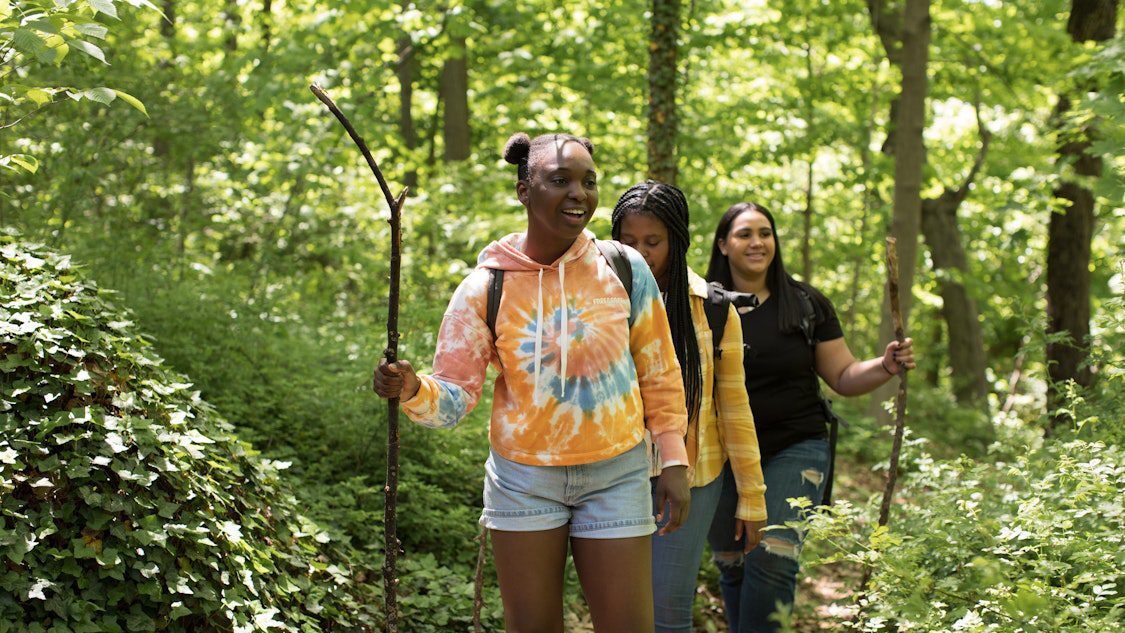
Every day, especially during Women’s History Month, our social media feeds flood with tributes and images of historical icons. And yes, many of those icons were Black, Indigenous, and women of color—visionaries who’ve always been leading progress, even when history books left them out!
Here is a short list of 10 women who are actively dismantling systems of oppression through their intersectional identities as lawmakers, storytellers, scholars, and athletes.
Their work matters deeply to us because these women exemplify what becomes possible. We celebrate them because their work reflects what we believe: that narrative change work requires strategic action, because that’s when real change happens. And that’s exactly where our work lives.
Transforming Political Landscapes
1. Rep. Sharice Davids: Representation as Revolution
The path from the martial arts ring to congressional chamber isn’t a common career trajectory. For Sharice Davids, both demanded the same fierce determination to shatter barriers.
Born to a mother serving as an Army drill sergeant, Davids found early inspiration in Bruce Lee. That determination propelled her from community college through Cornell Law School, while training to become a professional mixed martial arts fighter.
When Davids won her congressional seat in 2018, she made history as the first out LGBTQIA+ Indigenous American in Congress and the first Democrat to represent a Kansas district in a decade. As the sole Democrat in Kansas’ Republican-dominated delegation, she brings perspectives routinely sidelined in policy debates.
Davids doesn’t just occupy space! She transforms it by bringing her Ho-Chunk Nation heritage into a system built to exclude Indigenous voices.
2. Kaohly Her: Legislating for Liberation
Some politicians make legislation based on poll numbers. Kaohly Her writes laws based on personal experience and a refugee’s deep understanding of freedom.
Her’s landmark End Child Marriage Bill raised Minnesota’s legal marriage age to 18 without exceptions. This legislation was connected to her own experience when an older man sought permission to marry her during high school. Her police arbitration reform established specialized arbitrators for police misconduct cases, while she championed measures against anti-Asian hate crimes and gun violence.
Her comprehensive approach to human rights and immigration justice mirrors our commitment at FUNKY BROWN CHICK to addressing interconnected systems of oppression.
Reclaiming Cultural Narratives
3. Laverne Cox: Visibility as Power
As the first openly transgender performer nominated for a Primetime Emmy in an acting category, Laverne Cox shattered Hollywood’s narrowminded vision of who deserves to be seen. Who deserves a place in Hollywood.
Her role as Sophia Burset in “Orange is the New Black” opened doors previously closed. Not surprisingly, though, Cox refused to be tokenized. She used her visibility to produce Emmy-winning documentaries like “Laverne Cox Presents: The T Word” and “Disclosure: Trans Lives on Screen.” This forced a new way of thinking, instead of how the media has historically depicted transgender people.
Cox’s strategic presence on magazine covers—TIME, Cosmopolitan, British Vogue, Essence–reconfigured the media landscape. Each cover showed the world that transgender stories (and people) matter.
4. America Ferrera: Art as Activism
America Ferrera transforms scripts into springboards for social change. The youngest daughter of Honduran immigrants, Ferrera’s journey from “Real Women Have Curves” to “Barbie” reflects her commitment to reshaping Hollywood’s portrayal of Latina women.
At 23, Ferrera became the first Latina to win the Emmy for best lead actress in a comedy series. Rather than settling into comfortable stardom, she expanded into producing, directing, and founding HARNESS, a nonprofit amplifying underrepresented and excluded voices.
Ferrera uses her platform to advocate for immigration reform and gender equity. She understands that representation without systemic change only brings light to oppression without actually fixing it.
Her approach aligns perfectly with our firm’s art for social change work, where cultural expression drives concrete policy outcomes.
5. Maysoon Zayid: Comedy as Resistance
“I’m a Palestinian Muslim virgin with cerebral palsy from New Jersey,” Maysoon Zayid often introduces herself. She immediately disarms audiences with humor before challenging their preconceptions.
As one of the United States’ first Muslim women comedians, Zayid makes space for confronting uncomfortable truths about disability rights and the Israel-Palestine conflict. Co-founding the New York Arab-American Comedy Festival created a foundation for other underrepresented voices in comedy.
Beyond entertainment, Zayid spends three months annually running arts programs for children who are disabled and orphaned in refugee camps. These camps use creative expression to help children process trauma. The programs also bridge divides between children with and without disabilities. Remarkably, her comedy funds 80% of this humanitarian work.
Zayid embodies our belief that art creates social change not just through representation but through direct community action.
Preserving Histories, Shaping Futures

6. Erika Lee: Documenting Resistance
Erika Lee uses history as a weapon against forgetting. As the granddaughter of Chinese immigrants and Harvard’s first Bae Family Professor of History, Lee uncovers the United States’ hidden patterns of prejudice to fight today’s challenges.
Her award-winning books–”At America’s Gates,” “Angel Island,” “The Making of Asian America,” and “America for Americans”–fill important gaps in US history. The New York Times called her work “sweeping” and “fascinating” because it shows how the past shapes our present.
When anti-Asian violence rose during the pandemic, Congress asked Lee to testify. She connected today’s attacks to historical patterns and demanded accountability for the systems that allow such violence to continue.
Lee’s focus on documenting resistance matches our racial justice and immigration work at FUNKY BROWN CHICK. We know that facing history is crucial for building better futures.
7. Helen Zia: Journalism as Justice
Helen Zia turned tragedy into a movement. After Vincent Chin was murdered in 1982 by auto workers who blamed Japan for Detroit’s job losses, Zia’s journalism united diverse Asian groups into a powerful Asian American voice.
Her reporting pushed federal officials to bring civil rights charges. This marks the first time the US government acted for an Asian American in a civil rights case.
Zia continued her impact through books like “Asian American Dreams” and “Last Boat Out of Shanghai,” which tell stories often left out of mainstream US history. Her book “My Country Versus Me” revealed racial profiling in the case of scientist Wen Ho Lee.
In 2008, Zia made her wedding to her same-sex partner of 16 years into a public statement. She invited reporters to show that “this fundamental issue of equality and human dignity affects our Asian American communities too.”
From working construction to graduating Princeton to becoming an award-winning journalist, Zia shows how changing stories can, itself, create change. How? Community organizers take these historical lessons and turn them into powerful movements.
Building Community Power
8. Sarah Eagle Heart: Indigenous Leadership
Sarah Eagle Heart began fighting for her community as a young activist on the Pine Ridge Indian Reservation, organizing protests against an offensive homecoming ceremony at a neighboring high school.
This early activism grew into a career spanning international leadership, storytelling, and philanthropy. As CEO of Native Americans in Philanthropy, Eagle Heart directs resources to Native communities often overlooked by mainstream funding. Her Emmy-winning work on “Crow: The Legend” brought Indigenous folktales to new audiences through animation.
In 2019, Eagle Heart launched Return to the Heart Foundation, an Indigenous women-led organization fighting for climate justice. Her approach centers Indigenous women as solution-makers rather than victims.
9. Barbara Smith: Revolutionary Frameworks
Barbara Smith gave us the language to fight oppression before most Americans were ready to hear it. As co-founder of the Combahee River Collective in 1974, Smith helped create the concept of “identity politics”–the idea that our identities shape our political experiences.
Since the early 1970s, Smith has built a legacy as a Black lesbian feminist scholar, activist, publisher, and teacher. Her founding of Kitchen Table: Women of Color Press created the first US publisher dedicated to work by women of color.
Recently, Smith has focused on how nuclear conflict would harm vulnerable communities most severely, linking nuclear threats to other forms of oppression.
Smith’s intersectional approach mirrors our commitment to racial justice and human rights at FUNKY BROWN CHICK. Young voices now build on these revolutionary frameworks to create new paths forward.
Breaking New Ground
10. Mia Bhuta: Youth in Action
At just 19 years old, Mia Bhuta has already made history as the first Indian American–of any gender–to play at a FIFA tournament. Her journey to the US Women’s National Team mirrors her father’s immigration story.
When the US faced India in the 2022 FIFA U-17 Women’s World Cup, Bhuta saw an opportunity. An opportunity to amplify diverse representation in sports. “What’s most important to me is the inspiration that both teams can be for all the Indian girls here,” she said.
Now a midfielder for Stanford Cardinal, Bhuta balances athletic excellence with advocacy. She leverages her platform to support girls following their soccer dreams, creating pathways where none existed before.
Bhuta represents the next generation carrying forward the work of racial justice through sports and cultural representation.
The Power of Digital Amplification

These ten remarkable women have mastered using many platforms to multiply their impact. From strategic social media to viral content, they’ve created megaphones for voices often muted or even silenced.
At FUNKY BROWN CHICK, we help nonprofits apply diverse solutions to accomplish their mission through services like data analytics, digital marketing, and narrative change services. Our work with nearly 100 organizations has shown how strategic digital strategies transform good intentions into measurable social impact.Ready to amplify your organization’s voice? Contact us today to learn how we can help you achieve the kind of transformative change these ten women demonstrate is possible.
